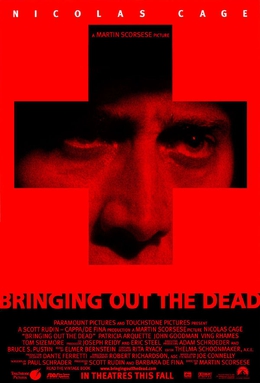Bringing Out the Dead
Bringing Out the Dead is a 1999 American psychological drama film directed by Martin Scorsese and written by Paul Schrader, based on the novel of the same name by Joe Connelly. The film stars Nicolas Cage as Frank Pierce, a burnt-out paramedic working the graveyard shift in early-1990s New York City. It explores themes of life, death, and redemption, set against the backdrop of a decaying and violent urban landscape.
Plot[edit | edit source]
Frank Pierce is a paramedic who has been working the streets of Manhattan's Hell's Kitchen for five years. Haunted by the patients he has lost, Frank is on the brink of a nervous breakdown. Over three consecutive nights, the film follows Frank and three different partners as they encounter the city's nocturnal denizens and confront their own inner demons. Frank is especially tormented by the memory of an 18-year-old girl he failed to save. Throughout his shifts, Frank searches for redemption, encountering various characters including a former junkie named Mary Burke, played by Patricia Arquette, whom he develops a complex relationship with.
Cast[edit | edit source]
- Nicolas Cage as Frank Pierce
- Patricia Arquette as Mary Burke
- John Goodman as Larry
- Ving Rhames as Marcus
- Tom Sizemore as Tom Walls
- Marc Anthony as Noel
- Cliff Curtis as Cy Coates
Production[edit | edit source]
The film was produced by Paramount Pictures and Touchstone Pictures, with Martin Scorsese at the helm. The screenplay, adapted by Paul Schrader from Joe Connelly's novel, marks the fourth collaboration between Scorsese and Schrader, who previously worked together on classics such as Taxi Driver and Raging Bull. The choice of Nicolas Cage for the lead role was due to his ability to convey deep emotional turmoil and vulnerability. Filming took place in various locations around New York City, capturing the gritty reality of the city's streets at night.
Reception[edit | edit source]
Bringing Out the Dead received generally positive reviews from critics, who praised its direction, Cage's performance, and its atmospheric portrayal of New York City. However, the film was not a commercial success, struggling to recoup its production budget at the box office. Despite this, it has gained a cult following over the years and is regarded as an underrated entry in Scorsese's filmography.
Themes[edit | edit source]
The film delves into the psychological impact of trauma on first responders, exploring the thin line between life and death they navigate every night. It also examines the concept of salvation, both in the sense of saving lives and in finding personal redemption. The chaotic and decaying urban setting serves as a metaphor for the protagonist's mental state, with the night acting as a canvas for his journey towards absolution.
Legacy[edit | edit source]
Bringing Out the Dead remains a powerful examination of the human condition, showcasing Scorsese's and Schrader's talents in creating compelling narratives that explore the darker aspects of life. Its portrayal of a paramedic's life has been noted for its authenticity and emotional depth, contributing to the film's status as a poignant commentary on the challenges faced by emergency responders.
Search WikiMD
Ad.Tired of being Overweight? Try W8MD's physician weight loss program.
Semaglutide (Ozempic / Wegovy and Tirzepatide (Mounjaro / Zepbound) available.
Advertise on WikiMD
|
WikiMD's Wellness Encyclopedia |
| Let Food Be Thy Medicine Medicine Thy Food - Hippocrates |
Translate this page: - East Asian
中文,
日本,
한국어,
South Asian
हिन्दी,
தமிழ்,
తెలుగు,
Urdu,
ಕನ್ನಡ,
Southeast Asian
Indonesian,
Vietnamese,
Thai,
မြန်မာဘာသာ,
বাংলা
European
español,
Deutsch,
français,
Greek,
português do Brasil,
polski,
română,
русский,
Nederlands,
norsk,
svenska,
suomi,
Italian
Middle Eastern & African
عربى,
Turkish,
Persian,
Hebrew,
Afrikaans,
isiZulu,
Kiswahili,
Other
Bulgarian,
Hungarian,
Czech,
Swedish,
മലയാളം,
मराठी,
ਪੰਜਾਬੀ,
ગુજરાતી,
Portuguese,
Ukrainian
Medical Disclaimer: WikiMD is not a substitute for professional medical advice. The information on WikiMD is provided as an information resource only, may be incorrect, outdated or misleading, and is not to be used or relied on for any diagnostic or treatment purposes. Please consult your health care provider before making any healthcare decisions or for guidance about a specific medical condition. WikiMD expressly disclaims responsibility, and shall have no liability, for any damages, loss, injury, or liability whatsoever suffered as a result of your reliance on the information contained in this site. By visiting this site you agree to the foregoing terms and conditions, which may from time to time be changed or supplemented by WikiMD. If you do not agree to the foregoing terms and conditions, you should not enter or use this site. See full disclaimer.
Credits:Most images are courtesy of Wikimedia commons, and templates Wikipedia, licensed under CC BY SA or similar.
Contributors: Prab R. Tumpati, MD

